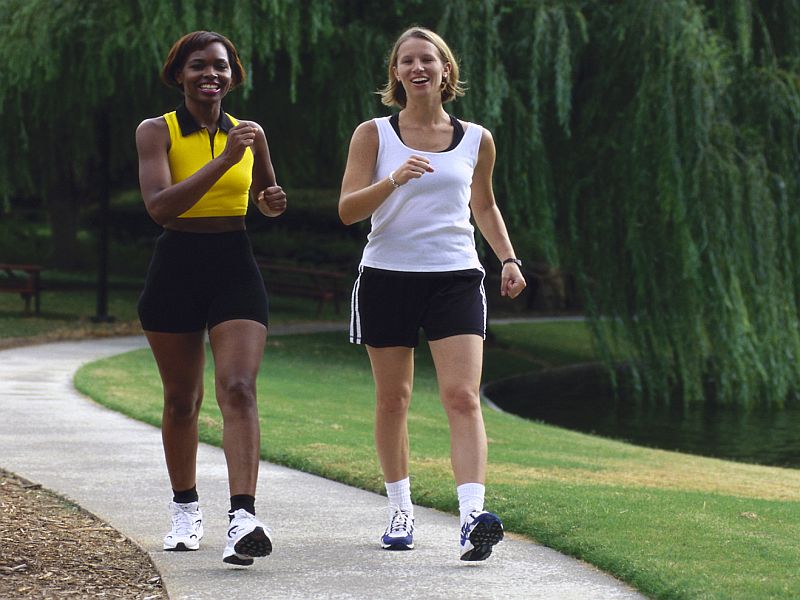The Great Place for all lake forest health and fitness | island health and fitness | health and fitness blogs Health and Fitness Blog Information and News.
Friday 30 June 2017
Why Bulgaria is training UK doctors
Old brains can’t hear similar sounds but a drug can change that
Old brains can’t hear similar sounds but a drug can change that
Old brains can’t hear similar sounds but a drug can change that
More Americans Are Walking for Exercise
It's an easy, inexpensive way to get moving and reap the health benefits, experts say

Source: HealthDay via Exercise and Physical Fitness New Links: MedlinePlus RSS Feed Read More Here..
Old brains can’t hear similar sounds but a drug can change that
Old brains can’t hear similar sounds but a drug can change that
Old brains can’t hear similar sounds but a drug can change that
One $100m grant, eight life-changing ideas: Which would you choose?
Old brains can’t hear similar sounds but a drug can change that
Old brains can’t hear similar sounds but a drug can change that
Old brains can’t hear similar sounds but a drug can change that
Old brains can’t hear similar sounds but a drug can change that
Old brains can’t hear similar sounds but a drug can change that
Old brains can’t hear similar sounds but a drug can change that
Old brains can’t hear similar sounds but a drug can change that
Old brains can’t hear similar sounds but a drug can change that
Old brains can’t hear similar sounds but a drug can change that
Old brains can’t hear similar sounds but a drug can change that
Old brains can’t hear similar sounds but a drug can change that
Old brains can’t hear similar sounds but a drug can change that
Old brains can’t hear similar sounds but a drug can change that
Old brains can’t hear similar sounds but a drug can change that
Thursday 29 June 2017
Old brains can’t hear similar sounds but a drug can change that
Old brains can’t hear similar sounds but a drug can change that
Old brains can’t hear similar sounds but a drug can change that
Old brains can’t hear similar sounds but a drug can change that
Should the long-term ill have free prescriptions?
The way we run protects our upper bodies but our legs suffer
People with higher IQs are more likely to live to their 80s
A mum on having electric shock therapy while pregnant
People with higher IQs are more likely to live to their 80s
People with higher IQs are more likely to live to their 80s
People with higher IQs are more likely to live to their 80s
People with higher IQs are more likely to live to their 80s
People with higher IQs are more likely to live to their 80s
People with higher IQs are more likely to live to their 80s
People with higher IQs are more likely to live to their 80s
People with higher IQs are more likely to live to their 80s
People with higher IQs are more likely to live to their 80s
People with higher IQs are more likely to live to their 80s
People with higher IQs are more likely to live to their 80s
People with higher IQs are more likely to live to their 80s
The defibrillator drone that can beat ambulance times
People with higher IQs are more likely to live to their 80s
People with higher IQs are more likely to live to their 80s
Wednesday 28 June 2017
Best and Worst in Health and Healthcare – May 2017
In May, next generation therapies took the spotlight: brain-computer interfaces, brain training, tDCS, DNA vaccines, probiotics… Yet, they weren’t all successful.
Here’s the best and worst news of May.
The best
Brain–computer interface therapy for post-stroke motor rehabilitation
Functional recovery from motor disabilities can be a major challenge following stroke. A new study tested a new therapy for motor-related disabilities affecting the arm in hemiparetic stroke survivors. It consisted of an exoskeleton driven by a brain–computer interface (BCI) that used neural activity from the unaffected brain hemisphere to control the movement of the affected hand. By using BCI control to associate imagined hand movements with the opening and closing of the affected hand, participants would train the uninjured parts of their brain to take over movements that were previously controlled by the injured areas of the brain. This BCI-based therapy was shown to be effective in improving motor performance. Another important aspect of this study was the fact that this method was designed and configured for home-based neurorehabilitation. Its efficacy therefore showed that BCI-driven neurorehabilitation can be effectively delivered in the home environment.
A probiotic for IBS-associated depression
Irritable bowel syndrome (IBS) affects 11% of the world’s population and is commonly accompanied by psychiatric symptoms, namely depression and anxiety. The gut microbiota is increasingly acknowledged as a key player in IBS and, via the gut-brain axis, as a likely contributor to the development of the associated psychiatric disorders. Therefore, a new study aimed at evaluating the effects of a probiotic bacteria on anxiety and depression in patients with IBS. The probiotic Bifidobacterium longum NCC3001 (BL) was administered to 44 adults with IBS and anxiety and/or depression for 6 weeks. It was shown that patients who received the probiotic were more likely to have a reduction in depression scores (but not anxiety) and increased quality of life than patients in the placebo group. BL had no effect on IBS, indicating that the reduction in depression scores was not merely a consequence of a reduction in IBS symptoms. Through fMRI analysis, these effects were shown to be linked to changes in brain activation patterns reflecting an effect of the probiotic on the limbic system.
Brain training for chronic TBI
Brain training has shown beneficial effects in acute traumatic brain injury (TBI) therapy, but studies on its effects in chronic TBI are still lacking. Therefore, a new study aimed at determining how the injured brain responds to cognitive training months-to-years after injury. Subjects with chronic TBI received cognitive training for 8 weeks. Cortical thickness and brain connectivity were assessed as indicators of brain plasticity before training, immediately after training, and 3 months after training.
Results showed that cortical thickness and brain connectivity were improved after strategy-based reasoning training, which focused on selective attention, abstract reasoning, and other cognitive strategies. Importantly, these improvements were evident even 3 months after training was completed, indicating a sustained effect.
DNA vaccines for Alzheimer’s disease
DNA vaccines may be the next generation of vaccines. They are designed to induce the production of antigens through the action of genetically engineered DNA, thereby triggering a protective immunological response. Although they are not yet approved for human use, they have been showing interesting beneficial effects in pre-clinical research. A new study has tested a DNA A?42 trimer vaccine (targeting amyloid plaques) for its effect on experimental Alzheimer’s disease.
It was shown that DNA A?42 immunization produced a high antibody response and that the antibodies generated after vaccination were able to detect amyloid plaques in the brain, suggesting a promising preventive effect for Alzheimer’s disease.
Cannabinoids for age-related cognitive decline
The activity of the endocannabinoid system declines during aging, with the expression of the CB1 cannabinoid receptor and the levels of the major endocannabinoid (2-AG) being reduced in the brain of older animals. In a letter published in Nature Medicine, new data shows that a prolonged exposure to low doses of the cannabinoid delta-9-tetrahydrocannabinol (THC, the main psychoactive substance in cannabis) can reverse the age-related cognitive decline in mice, improving spatial memory, long-term memory and learning flexibility.
The effect was accompanied by an increase in synaptic density in the hippocampus and a restoration of hippocampal gene transcription to patterns similar to those of young animals. This indicates a potential beneficial effect of cannabinoids in treating age-related cognitive impairments.
The worst
Sleep disturbances may increase the risk of dementia
Sleep disturbances are known to contribute to an overall deterioration of health. An association between sleep disorders and the development of dementia has also been proposed. A new study aimed at determining if this association is indeed observable in population-based studies. A first phase of the study took place between 1984 and 1989, when data about the sleeping patterns of the participants was collected. The incidence of dementia in those participants was now assessed using data from health registries. It was found that the risk ratio for dementia was significantly higher in individuals with frequent sleep disturbances.
Maternal stress and fetal development
Corticotropin-releasing hormone (CRH) and urocortin (UCN) are two proteins with important roles in both human stress regulation and pregnancy. Therefore, a new study investigated the association between an acute stress response, social overload (as an indicator of chronic stress) and the levels of CRH and UCN in the amniotic fluid of healthy, second-trimester pregnant women. The analyzes revealed that an acute maternal stress response was not associated with increased levels of the two peptides, but that maternal chronic social overload and amniotic CRH were positively correlated. Amniotic CRH was found to be able to influence fetal growth albeit in a non-linear way. This indicates that, although acute maternal stress may not be as influential, chronic maternal stress may affect the production of molecules, such as CRH, that can potentially influence fetal development.
tDCS does not improve the effect of cognitive training
Transcranial direct-current stimulation (tDCS) has been suggested be able to enhance cognitive abilities when associated with cognitive training. This claim has been tested in a new study of 123 older adults, in whom the effects of 20 sessions of anodal tDCS over the left prefrontal cortex and simultaneous working memory training on cognitive performance was assessed. Results showed that tDCS failed to improve the efficacy of cognitive training. A meta-analysis including younger and older individuals was also performed. It also indicated that tDCS is not effective at improving the effect of cognitive training in working memory and global cognition. It is possible that the inefficacy of tDCS may be due to an inadequacy of current tDCS protocols for enhancing the effects of cognitive training, indicating that those protocols may need to be optimized.
The onset of cocaine addiction
Cues associated with the consumption of cocaine can lead to dopamine release in the striatum brain region. This response is believed to be associated with the the motivation to consume. The acquisition of drug-seeking behaviors is believed to be associated with conditioned dopamine responses in the ventral striatum. But as drug use continues and becomes a habit, the conditioned responses shift to the dorsal striatum, which may be associated with compulsive drug use and susceptibility to addiction. A new study used PET imaging and personalized cocaine cues to assess the pattern of the dopamine response in in recreational cocaine users without a substance use disorder. The results showed that the exposure to cues associated with the opportunity to use the drug increased the dopamine response in the dorsal striatum in recreational cocaine users. This indicates that a susceptibility to addiction may be developing even though there are no psychiatric signs of a substance abuse disorder.
Inflammation and oxidation in Huntington’s disease
Chronic neuroinflammation and oxidative stress are believed to play an important role in driving Huntington’s disease progression. NRF2 is a transcription factor with a chief role in regulating cellular anti-inflammatory and antioxidant defense genes. A new study has reveled that NRF2 activation was suppressed in neural stem cells of Huntington’s disease patients, suggesting that these cells may be abnormally susceptible to oxidative stress. On the bright side, it was shown that the pharmacological activation of NRF2 was able to decrease inflammatory responses in glial cells, the main cellular mediators of neuroinflammation, and in blood monocytes from Huntington’s disease patients. These findings also suggest that NRF2 may be an important therapeutic target in Huntington’s disease.
References
Bilkei-Gorzo A, et al (2017). A chronic low dose of ?9-tetrahydrocannabinol (THC) restores cognitive function in old mice. Nat Med. doi: 10.1038/nm.4311. [Epub ahead of print]
Bundy DT, et al (2017). Contralesional Brain-Computer Interface Control of a Powered Exoskeleton for Motor Recovery in Chronic Stroke Survivors. Stroke. pii: STROKEAHA.116.016304. doi: 10.1161/STROKEAHA.116.016304. [Epub ahead of print]
Cox SML, et al (2017). Cocaine Cue-Induced Dopamine Release in Recreational Cocaine Users. Sci Rep, 7: 46665. doi: 10.1038/srep46665
Han K, et al (2017). Strategy-based reasoning training modulates cortical thickness and resting-state functional connectivity in adults with chronic traumatic brain injury. Brain Behav, 7(5):e00687. doi: 10.1002/brb3.687s.
La Marca-Ghaemmaghami P, et al (2017). Second-trimester amniotic fluid corticotropin-releasing hormone and urocortin in relation to maternal stress and fetal growth in human pregnancy. Stress, 21:1-10. doi: 10.1080/10253890.2017.1312336pregnanc. [Epub ahead of print]
“p1″>Lambracht-Washington D, et al (2017). Evaluation of a DNA A?42 vaccine in adult rhesus monkeys (Macaca mulatta): antibody kinetics and immune profile after intradermal immunization with full-length DNA A?42 trimer.Alzheimers Res Ther, 9(1):30. doi: 10.1186/s13195-017-0257-7.
Luojus MK, et al (2017).Self-reported sleep disturbance and incidence of dementia in ageing men. J Epidemiol Community Health, 71(4):329-335. doi: 10.1136/jech-2016-207764.
Nilsson J, et al (2017). Direct-Current Stimulation Does Little to Improve the Outcome of Working Memory Training in Older Adults. Psychol Sci. doi: 10.1177/0956797617698139. [Epub ahead of print]
Pinto-Sanchez MI, et al (2017).Probiotic Bifidobacterium longum NCC3001 Reduces Depression Scores and Alters Brain Activity: a Pilot Study in Patients With Irritable Bowel Syndrome.Gastroenterology. pii: S0016-5085(17)35557-9. doi: 10.1053/j.gastro.2017.05.003. [Epub ahead of print]
Quinti L, et al (2017). KEAP1-modifying small molecule reveals muted NRF2 signaling responses in neural stem cells from Huntington’s disease patients.Proc Natl Acad Sci U S A, pii: 201614943. doi: 10.1073/pnas.1614943114. [Epub ahead of print]
Image via DarkoStojanovic/Pixabay.
via Brain Blogger Read More Here..Women need a rosy outlook? Then give us reason to be optimistic
Force, Frequency of Head Hits Jump as Young Football Players Get Older
Findings confirm that these injuries are linked to level of play

Source: HealthDay via Exercise for Children New Links: MedlinePlus RSS Feed Read More Here..
Why your real age may be older – or younger – than your years
Why your real age may be older – or younger – than your years
What Is 'Moderate' Exercise Anyway?
How to figure out the best intensity for you

Source: HealthDay via Exercise and Physical Fitness New Links: MedlinePlus RSS Feed Read More Here..
Living near noisy roads could make it harder to get pregnant
Living near noisy roads could make it harder to get pregnant
Living near noisy roads could make it harder to get pregnant
Living near noisy roads could make it harder to get pregnant
Living near noisy roads could make it harder to get pregnant
Living near noisy roads could make it harder to get pregnant
Painless flu jab patch for people scared of injections
Living near noisy roads could make it harder to get pregnant
Living near noisy roads could make it harder to get pregnant
Make-up artist offers free makeovers to cancer patients
Tuesday 27 June 2017
Living near noisy roads could make it harder to get pregnant
Living near noisy roads could make it harder to get pregnant
Living near noisy roads could make it harder to get pregnant
Living near noisy roads could make it harder to get pregnant
Joint United Nations statement on ending discrimination in health care settings
Living near noisy roads could make it harder to get pregnant
Living near noisy roads could make it harder to get pregnant
Living near noisy roads could make it harder to get pregnant
Living near noisy roads could make it harder to get pregnant
Charlie Gard parents lose court appeal
Living near noisy roads could make it harder to get pregnant
Can heightened empathy be a bad thing?
Can heightened empathy be a bad thing?
Can heightened empathy be a bad thing?
'Pharma bro' Martin Shkreli fraud trial opens in New York
Canada nurse Elizabeth Wettlaufer jailed for life for murders
Why bird flu risk is like the Grenfell Tower tragedy
Tick saliva 'gold mine' blocks killer heart condition
Suntans on children 'are not healthy'
Senate healthcare bill leaves 22m more without cover, CBO says
Monday 26 June 2017
What happens when you're sleep deprived?
Magnets used to control flickering eyes
Research on male animals prevents women from getting best drugs
Being Thin Could Boost Stress Fracture Risk in Female Runners
Researcher says less muscle mass can make leg bones more vulnerable to injury

Source: HealthDay via Exercise and Physical Fitness New Links: MedlinePlus RSS Feed Read More Here..